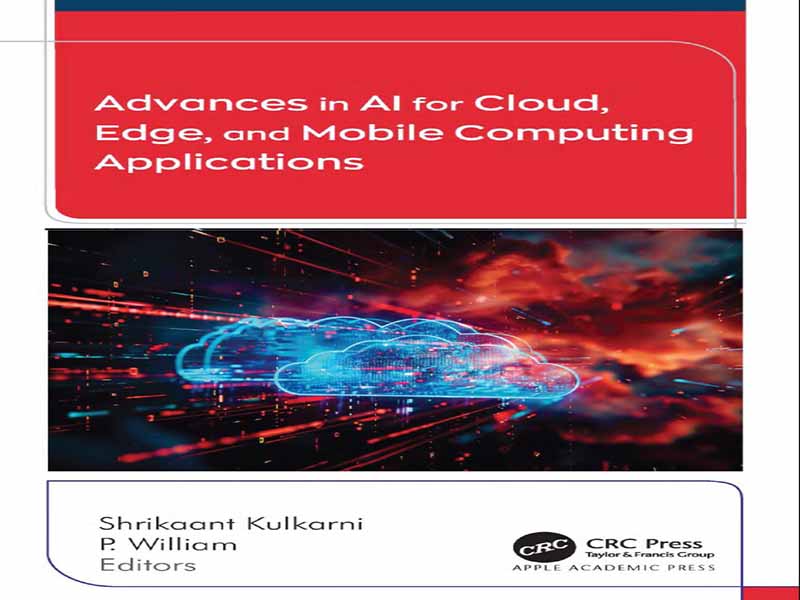- عنوان کتاب: Advances in AI for Cloud, Edge, and Mobile Computing Applications
- نویسنده: Shrikaant Kulkarni P. William
- حوزه: محاسبات ابری
- سال انتشار: 2025
- تعداد صفحه: 393
- زبان اصلی: انگلیسی
- نوع فایل: pdf
- حجم فایل: 4.19 مگابایت
این کتاب، کاربردهای پیشرفتهای هوش مصنوعی را ارائه میدهد که تقریباً در تمام جنبههای زندگی نفوذ کردهاند و این کاربردها در حوزههای متنوع، تقاضای زیادی دارند. هدف و محتوای کتاب، تغییر الگو در تمرکز و چهره نه تنها دنیای کار، بلکه توسعه و پیشرفت ابزارها و فناوریها برای آرمان بشریت و تداوم فعالیتهای انسانی را نیز به همراه خواهد داشت. این فناوریهای نوظهور با ارائه راهحلهای سفارشی، در کاربردهای متعددی نفوذ کردهاند. چنین ابتکارات مبتنی بر هوش مصنوعی به طور مداوم در حال تکامل هستند و باید در برآورده کردن نیازهای جهان از نظر دسترسی، چابکی، پایداری، مقرون به صرفه بودن، استحکام، امکانات زیرساختی و غیره، گامهای بلندی بردارند. این فناوریهای پیشرفته از نظر تأخیر بسیار کم، پاسخ سریع، هزینه پهنای باند کم و انعطافپذیری بهبود یافته، مزیت نسبی دارند. این امر توسط منابع داده و دستگاههای اینترنت اشیا در همسایگی نزدیک مصرفکنندگان تسهیل میشود، برخلاف محاسبات ابری که در آن یک مرکز جهانی برای ذخیرهسازی، تجزیه و تحلیل و بینش دادهها وجود دارد، در حالی که در محاسبات لبهای، اینترنت اشیا در لبه شبکه و نزدیک کاربران قرار دارند. این کتاب فصلهایی را پوشش میدهد که به ما نشان میدهد چگونه میتوانیم از محاسبات لبه، ابر و موبایل به عنوان فناوریهای امروزی استفاده کنیم و با بهرهگیری از ویژگیهای امیدوارکننده پیشرفتهای هوش مصنوعی، یکدیگر را برای حوزههای کاربردی گسترده و فراگیر تکمیل کنیم. پیشرفت در اینترنت اشیا، مسیرهای شبکه، محاسبات موازی، 5G و زیرساختهای مناسب به طور کلی برای یادگیری ماشین، امکان استفاده از تکنیکهای محاسبات لبه، ابر و موبایل را در حوزههای متنوع و اقشار مختلف زندگی فراهم کرده است.
این کتاب جنبههای مختلف محاسبات را از نظر روندها و پیشرفتها در محاسبات لبه، ابر و موبایل، ادغام آن با هوش مصنوعی پیشرفته، خدمات، نگرانیهای مربوط به حریم خصوصی و امنیت، الگوریتمها، معماریها، اینترنت اشیا قابل اعتماد مبتنی بر هوش مصنوعی، پیشرفتها در شبکه و برنامههای کاربردی در حوزههای مختلف، روشن میکند.
این کتاب به سه بخش تقسیم شده است. بخش اول به خدمات هوش مصنوعی ابری پیشرفته اختصاص دارد. بخش دوم به خدمات هوش مصنوعی لبه پیشرفته و مشکلاتی که در طول کاربرد و اجرای خدمات محاسباتی با آن مواجه میشویم، اختصاص دارد. بخش سوم به کاربردهای محاسبات هوش مصنوعی ابری، هوش مصنوعی لبه و هوش مصنوعی موبایل میپردازد. بخش اول شامل پنج فصل است. فصل ۱ به ارائه چارچوبی برای تجارت قدرت محاسبات لبه ابری در یک بازار هوش مصنوعی میپردازد. فصل ۲ به تشخیص ناهنجاری با استفاده از هوش مصنوعی در یک محیط ابری فازی میپردازد. فصل ۳ چگونگی انجام مدیریت جامع منابع مبتنی بر هوش مصنوعی و محاسبات ابری پایدار را روشن میکند. فصل ۴ به بررسی کاربرد هوش مصنوعی برای افزایش حریم خصوصی و امنیت در یک محیط هوشمند میپردازد. فصل ۵ با هدف بحث در مورد کاربرد هوش مصنوعی در شبکههای حسگر بیسیم از طریق افزایش کیفیت خدمات است.
بخش دوم کتاب پنج فصل دارد. فصل ۶ به پیشرفتهای اخیر هوش مصنوعی در محاسبات لبه میپردازد. فصل ۷ نوآوریهای آینده در استفاده از زیرساخت محاسبات لبه برای برنامههای اینترنت اشیا را پیشبینی میکند. فصل ۸ با هدف درک رشد محاسبات لبه با هوش مصنوعی است. فصل ۹ دیدگاهی در مورد نقش یادگیری ماشین در همگرایی هوش مصنوعی و محاسبات لبه ارائه میدهد. فصل ۱۰ کاربردها، فناوریهای توانمندساز و چشمانداز هوش مصنوعی لبه برای نسل ششم را توضیح میدهد. بخش سوم با پنج موضوع گنجانده شده است. فصل ۱۱ به چگونگی خدمترسانی محصولات هوش مصنوعی به حوزههای تجارت الکترونیک و بخش بانکداری تجاری میپردازد. فصل ۱۲ به چگونگی مدیریت پایدار منابع انسانی با استفاده از هوش مصنوعی میپردازد. فصل ۱۳ به دستیابی به اهداف توسعه پایدار با ادغام مدیریت منابع طبیعی و هوش مصنوعی میپردازد. فصل ۱۴ به استفاده از مدلهای کسبوکار در کنار هوش مصنوعی برای توسعه پایدار میپردازد. فصل ۱۵ به الزامات مختلف کیفیت خدمات با استفاده از یک الگوریتم شبکه تطبیقی میپردازد.
این کتاب برای دانشگاهیان و محققانی که نه تنها در پیشبرد دانش خود، بلکه در آشنایی با پیشرفتهای محاسبات ابری، لبهای و موبایل در هماهنگی با پیشرفتهای هوش مصنوعی هدایت میشوند، زمینهساز ایجاد راهکارهای فناورانه مناسب برای بهبود بشریت به شیوهای پایدار خواهد بود.
The book presents applications of advances in AI that have made inroads in almost all walks of life, and these applications in diverse areas are in great demand. The intent and content of the book will bring about a paradigm shift in the focus and complexion of not only the world of work but also the development and advancement of tools and technologies for the cause of humanity and the sustenance of human activities. These emerging technologies have made inroads in numerous applications by providing customized solutions. Such AI-powered initiatives are evolving constantly and need to go a long way in meeting the requirements of the world in terms of its outreach, agility, stability, affordability, robustness, infrastructural facilities, etc. These state-of-the-art technologies have a comparative advantage in terms of abysmally low latency, fast response, low bandwidth cost, and improved resilience. This is facilitated by data sources and IoT devices in the close neighborhood of the consumers, unlike cloud computing, wherein there is a globalized facility for data storage, analysis, and insight, while in edge computing, the IoTs are at the network edge near users. This book covers chapters that shed light and enlighten us on how we can use edge, cloud, and mobile computing as technologies of today and complement one another for extensive and widespread application areas by leveraging the promising features of advances in AI. The furtherance in IoTs, networking avenues, parallel computing, 5G, and sound infrastructure in general for machine learning has made it possible to employ edge, cloud, and mobile computing techniques in diverse areas and different walks of life.
This book sheds light on various aspects of computing in terms of trends and advances in edge, cloud, and mobile computing, integrating it with advanced AI, services, privacy and security concerns, algorithms, architectures, reliable AI-powered IoTs, advances in networking, and applications in different frontier areas.
The book is partitioned into three parts. Part I is devoted to Advanced Cloud AI services. Part II is dedicated to Advanced Edge AI services and the problems confronted during the application and execution of computing services. Part III deals with Cloud AI, Edge AI, and Mobile AI Computing Applications. Part I contains five chapters. Chapter 1 dwells upon the provision of a power trading framework of cloud-edge computing in an artificial intelligence bazaar. Chapter 2 delves into anomaly detection using artificial intelligence in a cloud-fuzzy environment. Chapter 3 sheds light on how holistic resource management based on AI and sustainable cloud computing is done. Chapter 4 deliberates on the application of Artificial Intelligence for the enhancement of privacy and security in a smart environment. Chapter 5 is aimed at discussing the application of Artificial Intelligence in Wireless Sensor Networks through Quality of Services enhancement.
Part II of the book has five chapters. Chapter 6 deals with recent advancements of Artificial Intelligence in Edge Computing. Chapter 7 foresees future innovations in using Edge Computing Infrastructure for IoT applications. Chapter 8 aims to understand the growth of Edge Computing with Artificial Intelligence. Chapter 9 gives a perspective on the role of Machine Learning in the convergence of Artificial Intelligence and Edge Computing. Chapter 10 explains the applications, enabling technologies, and vision of Edge Artificial Intelligence for 6G. Part III is embodied with five topics. Chapter 11 discusses how AI products serve the areas of E-Commerce and the commercial banking sector. Chapter 12 deliberates on how sustainable human resources are managed by using artificial intelligence. Chapter 13 discusses the achievement of sustainable development goals by integrating natural resource management and AI. Chapter 14 deliberates on the use of business models in tandem with AI for the cause of sustainable development. Chapter 15 deals with different requirements for Quality of Service using an Adaptive Network Algorithm.
This volume will set a tone for academicians and researchers who will be guided not only in advancing their knowledge but also in becoming acquainted with the advances in Cloud, Edge, and Mobile computing in congruence with advances in AI, thereby enabling the development of sound technological solutions for the betterment of humanity in a sustainable manner.
این کتاب را میتوانید از لینک زیر بصورت رایگان دانلود کنید:
Download: Advances in AI for Cloud, Edge, and Mobile Computing Applications





































نظرات کاربران